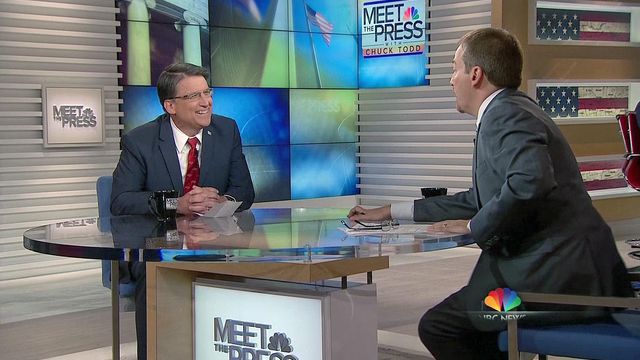McCrory: 'I'm not private sector's HR director'
Gov. Pat McCrory fiercely defended a new law that sets North Carolina's discrimination policy during a Sunday morning interview on NBC's "Meet the Press," saying government shouldn't interfere with how businesses treat their employees and customers.
Posted — Updated"I don't think government should be the HR director for every business," McCrory told "Meet the Press" host Chuck Todd, who questioned the governor about his decision to sign the Public Facilities Privacy & Security Act last month and the resulting backlash.
The law, commonly referred to as House Bill 2, requires people to use the public bathroom that matches the gender on their birth certificates, excludes gay and transgender people from protections against employment and public accommodations protections and bars cities and counties from extending such protections to them. The law also blocks cities from setting their own minimum wage and eliminates the right for workers to sue for job discrimination in state court.
Scores of corporations have balked at the law, several performers have canceled shows in the state because of it and the NBA is weighing whether to pull the 2017 All-Star Game out of Charlotte over it. NBC estimates that the law has cost North Carolina $39.7 million directly and led to $186 million in lost revenue, Todd said.
McCrory blamed the Charlotte City Council for creating the firestorm, saying the council never should have passed an ordinance that would have allowed transgender people to use the public bathroom in which they feel most comfortable. He said leaders of the General Assembly felt they had to call a special session to address the issue before the ordinance went into effect April 1.
"I will always call out government overreach," he said. "It's not the government's business to tell the private sector what their bathroom, locker room or shower practices should be."
Businesses can set their own LGBT policies under the law, he said.
Todd pressed him on parts of the law beyond the bathroom provision and asked how he would have liked state government telling him how to handle minimum wage and LGBT protections when he was mayor of Charlotte. He responded by saying his priorities as mayor were on police and fire protection and transportation.
"I'm not the private sector's HR director," he said. "I am the HR director and governor for all state employees."
That's why, he explained, he used an executive order last week to extend protections against discrimination based on sexual orientation and gender identity to state workers.
McCrory acknowledged that he didn't discuss the legislation with anyone in the LGBT community before the 12-hour period in which General Assembly passed it and he signed it into law. Since then, he said, he's has "very positive conversations" with some transgender people.
"We've got to have more dialogue and not threats," he said, adding that there is a "disconnect" between support for the law in many North Carolina towns and the outrage expressed by corporate executives.
Dealing with the "extremely new social norm" of being transgender creates a difficult balancing act of recognizing equality while respecting everyone's privacy, McCrory said.
"This is not just a North Carolina debate. This is a national debate that's come on in literally the last three months," he said. "There is passion on each side."
Related Topics
• Credits
Copyright 2024 by Capitol Broadcasting Company. All rights reserved. This material may not be published, broadcast, rewritten or redistributed.






